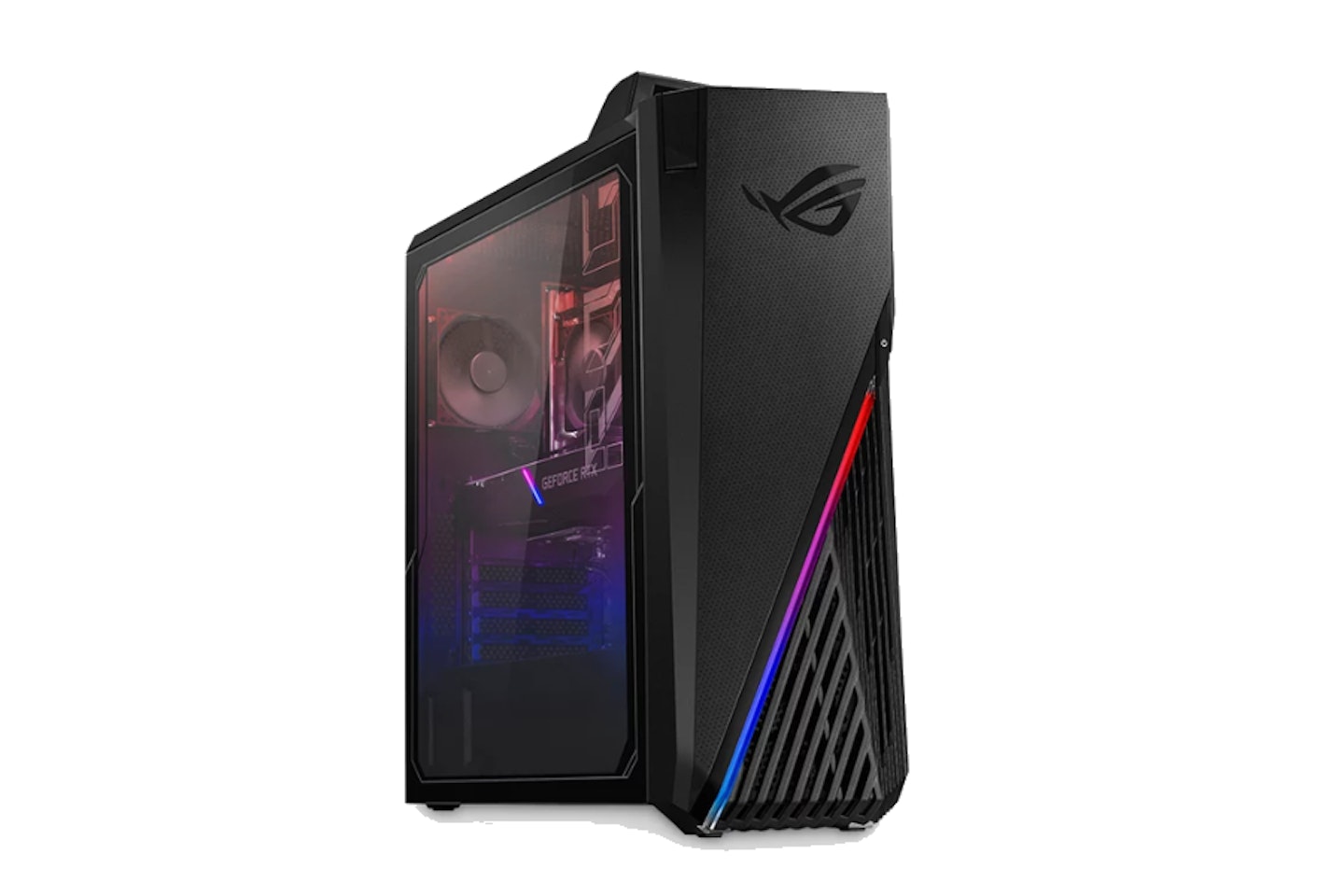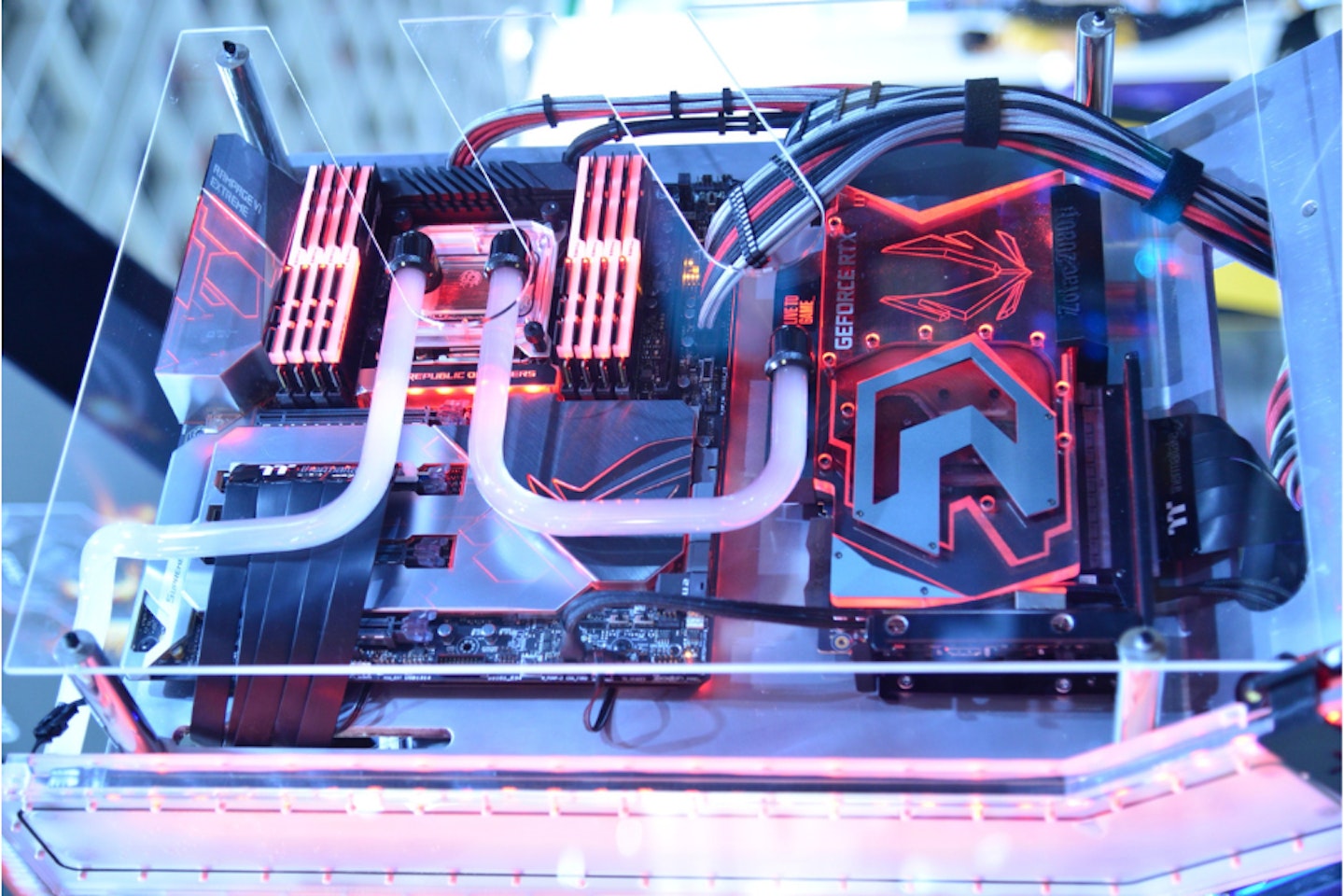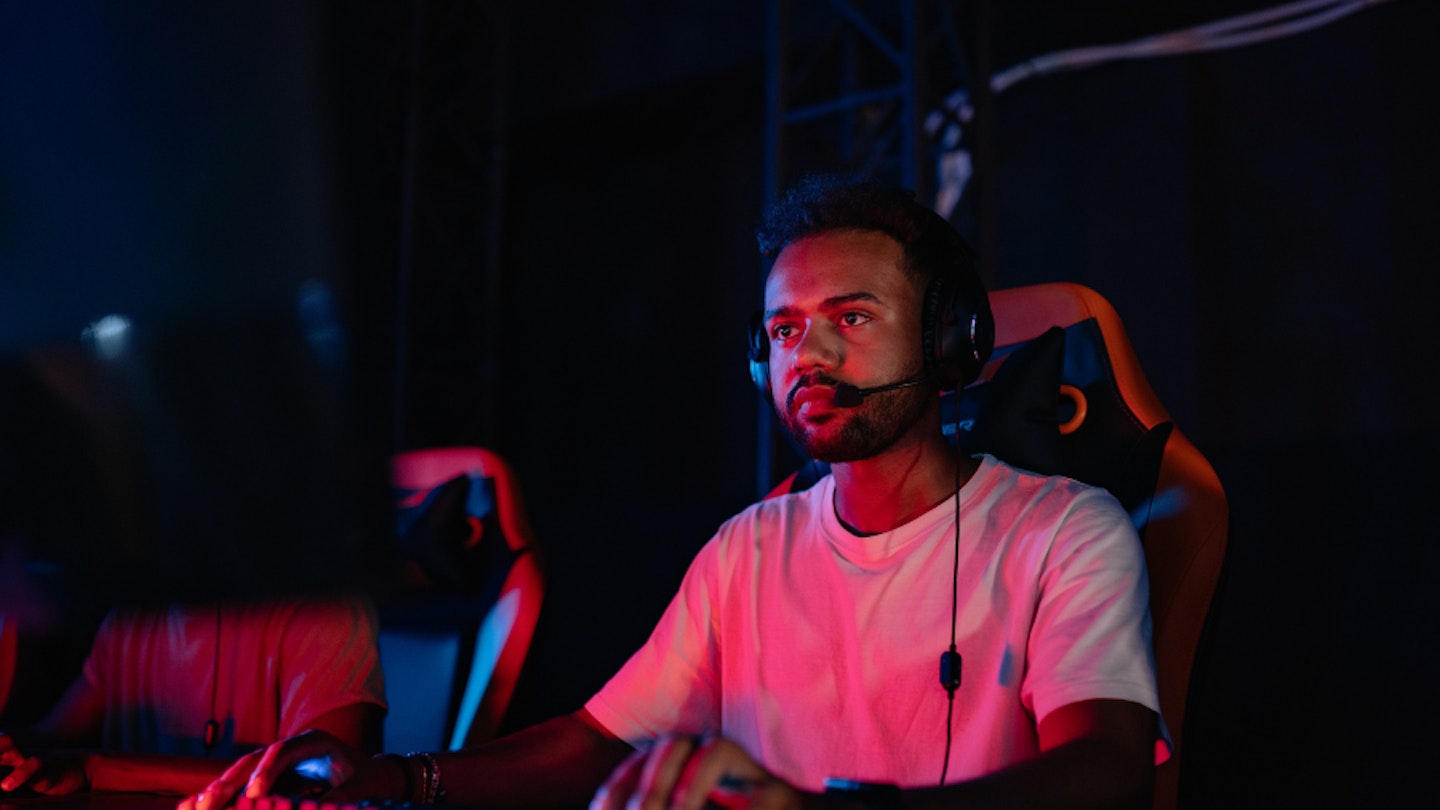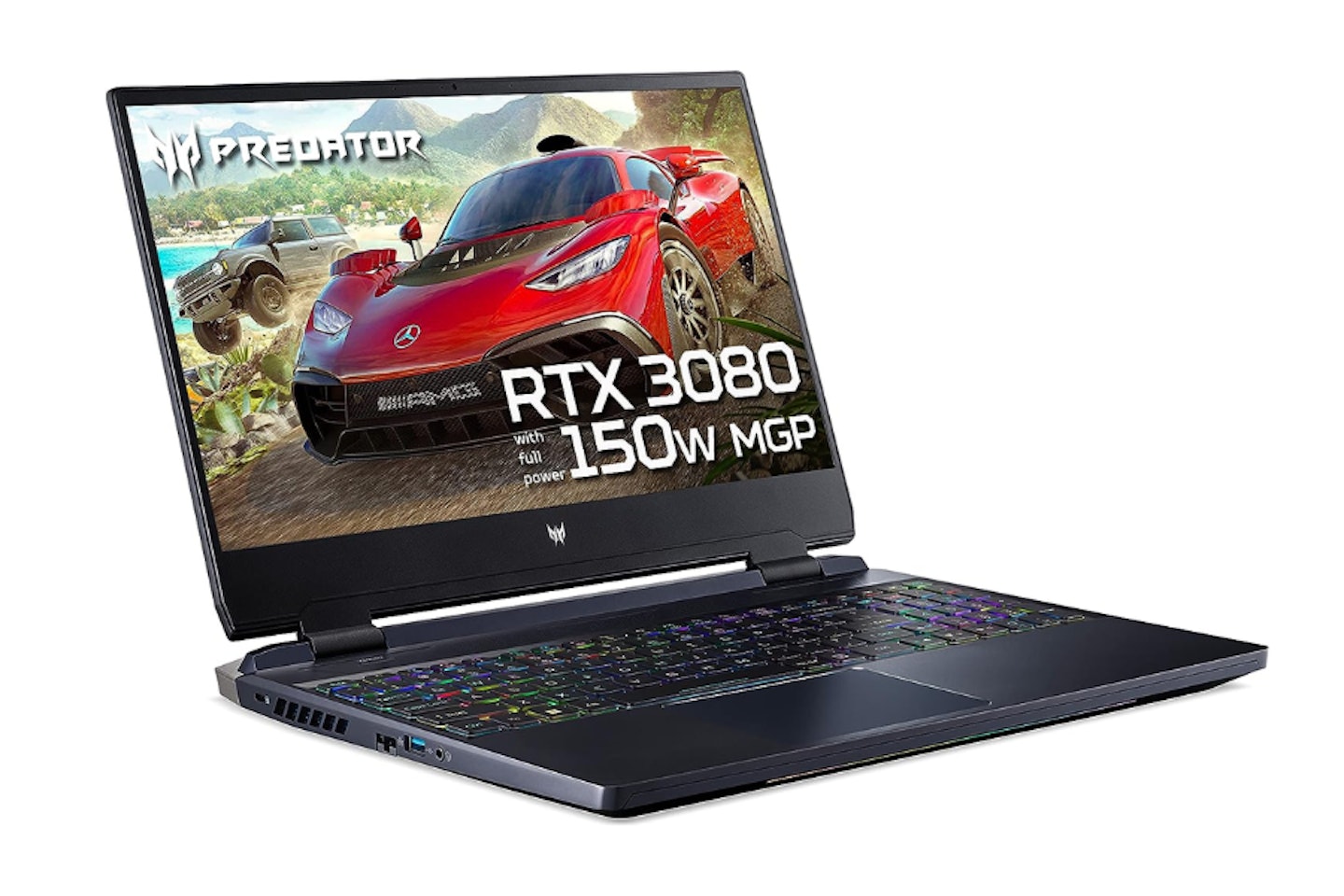Just a few years ago, any laptop VS PC debate between gamers would have ended before it began - with the PC taking the crown. But now some of the best laptops come with seriously cutting-edge graphics cards, Ryzen CPUs, and expandable RAM. The line between the technical capabilities of PCs and their portable counterparts has become thinner than ever.
But still, to ensure an optimal gaming experience there are a few things to consider before choosing the winner of your own laptop VS PC contest. Graphical and CPU power, storage, and expansion options are the key battlegrounds here. Yes, if you're looking for affordable gaming portability you'll probably be firmly in the laptops under £1000 category. If that's you, expect to sacrifice a few things here and there. But, as long as those concessions don't impact your core gaming specs, you're golden.
The best gaming laptop VS PC at a glance
• Best overall gaming laptop: ASUS ROG Strix G16 G614JZ Gaming Laptop - View on Amazon
• Best overall gaming PC: HP Omen 45L Gaming Desktop PC GT22-1004na - View on Amazon
• Best budget gaming laptop: ASUS TUF Gaming F15 - View on Amazon
• Best budget gaming PC: Fierce Ryzen Gaming PC 24" Monitor Bundle - View on Amazon
But if you prefer a large tower of power to game on, the best PCs offer amazing expandability and accessible upgrade paths. Not to mention huge power supplies to support those hungry GPUs. For us, it isn't just the machine's power that makes it great for gaming; you should also consider how the machine looks, plus the all-important screen size, resolution, and refresh rate. Also, don't forget that this probably won't just be for gaming. You should keep one eye on the quality of keyboards or trackpads as well as the overall build. So, with a lot to look out for, how do we go about choosing?
Well, here at What's The Best, we're always looking for the best bang for our buck. We're after the best gaming experience for the best price - but you have to be led by your own preferences; What we think may be a fantastic deal on an amazing gaming PC might not be as appealing to you; that depends on how portable your rig needs to be. Our experts have put together a comprehensive guide to help you choose your champion in the epic battle of gaming laptop VS PC. But first, here's our pick of the best from both camps.
Best gaming laptop VS PC
Best overall gaming laptop
Yes, the ASUS ROG Strix G16 is undoubtedly one of the most powerful gaming laptops of the year - with a price tag to prove it. It's packed with cutting-edge tech, with perhaps the star of the show being the NVIDIA 4090 GPU. That's backed up by a 12th-generation Intel i7 CPU and a more than generous 1TB SSD for storage. Design-wise, this screams pro-gamer with the whole Republic of Gamers' aesthetic: gunmetal finish, ultra-thin bezels and an ultra-wide display making up a super-solid build.
And you won't be stuck for gaming on the go with a very respectable battery life of 8 hours - great for the sheer size and power of this machine. It is, however, very large and reasonably weighty, so you'll need a decent backpack to lug it around in if you want to travel with it. Other than that, it's hard to find fault with an ASUS machine this well built and specced. If you have the cash, go for it.
Pros
- One of the most powerful gaming laptops on the market
- Terrific design
- Solid battery life
Cons
- A heavier laptop isn't great for those in need of portability
| Dimensions: | 35.4 x 3.04 x 26.4 cm |
| Graphics card: | NVIDIA RTX 4090 GPU |
| RAM: | 16GB |
| CPU: | Intel i7-12650HX |
| Display: | 1920 x 1200p (WUXGA) |
| Video connections: | HDMI 2.1 x 1, Thunderbolt 4 support |
| USB: | USB 3.2 x 2 |
| Audio connections: | Audio combination jack |
| Storage: | 1TB SSD |
| Battery life: | 8 hours |
- Customer review: "A really good quality laptop with everything required for amazing gaming."
Best overall gaming PC
Big, bulky, and suitably expensive; HP OMEN's 45L gaming PC is an absolute titan of a build, with a mammoth NVIDIA GeForce RTX 4080 for best-in-class gaming. There's a top-of-the-line Intel Core i9-13900K, a staggering 32GB of DDR5 RAM, and a seriously stunning case that isn't swayed by the trend of overly flashy tech-centric militaristic gaming PC aesthetics. That said, you still have controllable RGB lighting and dedicated liquid cooling for the CPU.
There isn't a game you could throw at the OMEN that it couldn't handle. You're essentially paying for cutting-edge hardware that's beautifully packaged and that's going to last you for years to come. PCs are an investment, if you can spare the expense, why not take the plunge?
Pros
- Amazing specification and hardware
- Stunning case design
- Solid HP build quality
- Cryo Chamber liquid cooler radiator
Cons
- Measure up before you buy, this case is on the large side
- Some report PSU fan more audible than the system fans
| CPU: | Intel Core i7-13700K |
| Storage: | 1 TB WD Black PCIe Gen4 NVMe TLC M.2 SSD; 2 TB 7200 rpm SATA HDD |
| RAM: | Kingston FURY 32 GB DDR5-5200 MHz XMP RGB Heatsink RAM (2 x 16 GB) |
| Graphics card: | NVIDIA GeForce RTX4080 (16 GB GDDR6X dedicated) |
| Video connections: | HDMI 2.1 x 1, Display Port 1.4 x 3 |
| Audio: | 5.1 surround sound; Omen Audio Control Support DTS:X Ultra, Audio ports (line-in/line-out/microphone) |
| USB: | 1x USB-C 5Gbps, 1x USB-C 10Gbps, 2x USB Type-A 5Gbps, 2x USB Type-A USB 2.0, 2x USB 3.0 5Gbps |
| OS: | Windows 11 |
| Dimensions: | 47 x 20.4 x 55.5 cm |
| Weight: | 22.6 KG |
- Customer review: "Easily upgradeable and well-designed chassis. Good performance in latest games and configurable lights (you can switch them to white, solid colour or off for a more professional look. Power supply fan is noticeably loud compared to the other fans in the system."
Best budget gaming laptop
A really solid budget choice that's going to give you some great gaming options. It'll crush most modern FPS shooters, games like Fortnite are no exception. While there may be some difficulties in running the absolute cutting-edge due to the weaker 4GB of VRAM with the 3050 GPU, we doubt it'll dip below 50 FPS with most AAA games you throw at it.
We also love the upgradeability option for budding builders who want a little longevity in their laptops, as this will support up to 32GB.
So, if you're looking for portable gaming on a budget, this ASUS TUF Gaming F15 is the best of many worlds - even if it's not a master in any particular area. It's a great all-around performer that ticks all the right boxes, as well as keeping your budget under control. And let's not forget that this is an ASUS machine - so you can expect a quality build too.
Pros
- Great hardware
- Modern case design
- Upgradeable
Cons
- Weaker 4GB VRAM on 3050 GPU
| CPU: | Intel Core i5-11400H (12MB Cache, 2.7GHz) |
| Storage: | 512GB SSD |
| RAM: | 8GB (3200MHz) DDR4-SDRAM (upgradeable to 32) |
| Graphics card: | NVIDIA GeForce RTX 3050 Ti (4GB) |
| Connectivity: | 1x HDMI 2.0 Port, 1x DisplayPort (over USB Type-C) Bluetooth 5.2,3x USB 3.2 Type-A, 1x USB 3.2 Type-C |
| Display: | 1920 x 1080p 144hz |
| Battery life: | not stated |
| Keyboard: | Backlit Chiclet Keyboard with NumberPad Touchpad |
| Dimensions / weight: | 359 mm x 256 mm x 22.8 mm / 2.3 KG |
| OS: | Windows 11 home |
- Customer review: "Really impressed with this laptop so far, only had it for couple of days, trying some of my more intense games (see the benchmark tests of Cyberpunk 2077 with path tracing on and maxed out settings, Warhammer 3 maxed out settings)"
Best budget gaming PC
For under £500 and including a monitor, keyboard and mouse, the Fierce Ryzen Gaming PC is a ferocious deal, with AMD Radeon Vega 8 Integrated Graphics. It's the perfect entry-level option for the young or light gamer. And, at a serious price difference from most PCs, you won't be disappointed.
There's 16GB of RAM and a 1TB SSD for lightning-fast performance too. Add to that and a decent 4GHz Quad-Core AMD Ryzen 3 3200G Processor and, despite not coming with a separate graphics card, you'll still find the Fierce to be capable of running most AAA titles.
Pros
- Good hardware
- Great looking case
- Included monitor, keyboard and mouse
- Seriously great value
Cons
- Only has integrated graphics (but room to add your own card if you wanted to)
| CPU: | 4GHz Quad-Core AMD Ryzen 3 3200G Processor |
| Storage: | 1TB M.2 NVME SSD |
| RAM: | 16 GB DDR4 |
| Graphics card: | AMD Radeon Vega 8 Integrated Graphics |
| Video connections: | HDMI, DVI |
| Audio connections: | 3.5 mm jack |
| USB: | USB 3.0 x 3, USB 2.0 x 3 |
| OS: | Windows 11 |
| Dimensions: | 63.8 x 59.8 x 47 cm |
| Weight: | 14.26 KG |
- Customer review: "I ordered this PC for my 11yr old son, we had no problem setting it up, he absolutely loves it, it was a fast delivery and everything worked perfectly, great value for money."
Best mid-budget gaming laptop
Big, bulky, and powerful, the Acer Predator Helios 300 is considered by many to be a top-tier laptop, and it's not particularly difficult to see why. It's packed with an 11th gen Intel i-7 CPU, 16GB of RAM, a great 144Hz screen, and the hefty RTX 3060 GPU, all in a 2.2KG laptop. It's also built impeccably well, with a 'Quad-Exhaust' cooling system to keep your precious hardware cool.
But of course, there are sacrifices in certain areas to keep that price tag down. The 512 GB of SSD storage is admittedly a little small for our liking but should suffice if you manage your storage effectively. There's also the weaker 4 1/2 hour battery life which is rather poor in terms of laptop performance but is understandable due to such demanding hardware. Overall, for the convenience of a complete gaming package ready to go, the sheer power of the Acer Predator Helios 300, as well as the portable convenience of it, you cannot go wrong with this machine.
Pros
- Fantastic graphics card
- Well-built and engineered
- Stunning performance on a laptop
Cons
- A little low on storage
- Battery life is middling
| CPU: | Intel Core i7 11th Gen 11800H Processor |
| Storage: | 512GB SSD |
| RAM: | 16 GB DDR4 |
| Graphics card: | NVIDIA GeForce RTX 3060 6 GB GDDR6 |
| Connectivity: | HDMI 2.1 x 1, Mini Display Port 1.4 x 1, 3.5 mm jack, USB Type-C x 2, USB 3.2 x 3, USB 2.0 x 4 |
| Display: | 1920 x 1080p 144Hz |
| Battery life: | 4h 30 mins |
| Keyboard: | Chiclet RGB fully programmable keyboard |
| Dimensions / weight: | 363.5 x 255 x 229 mm / 2.2 KG |
| OS: | Windows 11 |
- Customer review: "Superb laptop in every way, great screen too, very vivid almost like AMOLED, and bright too, processor can play Forza 5 on Extreme with no effort! Highly recommend."
Best mid-budget gaming PC

www.johnlewis.com
An absolute bargain for what is top-tier hardware, the ASUS ROG STRIX G15 is admittedly pricey. But, you'll be getting an NVIDIA RTX 3060 along with 1 TB of storage, a great motherboard, and a slick, modern-looking case. Not forgetting the 12th generation CPU and an additional 512GB of SSD storage.
As always, investing in one of the best gaming monitors that support high refresh rates is a must for any gamer, but with that RTX 3060 inside, the performance of this machine is going to satisfy almost any screen. There are expansion options on the motherboard for even more RAM too. So, gaming on this PC is going to be excellent for the foreseeable future. If you are going to push your gaming hard, perhaps even overclocking, you may want to control temperatures better by upgrading the fans.
Pros
- Incredible hardware
- Aesthetically pleasing
- Well built
Cons
- Consider upgrading the fans if you push gaming to the limit
| CPU: | Intel® Core™ i7-12700 Processor |
| Storage: | 1TB HDD, 512GB SSD |
| RAM: | 16 GB DDR4 (upgradeable to 64GB) |
| Graphics card: | NVIDIA GeForce RTX 3060 12 GB GDDR6 |
| Video connections: | HDMI 2.0a x 1, Display Port 1.4 x 1 |
| Audio connections: | 3.5 mm jack x 7 |
| USB: | USB Type-C x 2, USB 3.2 x 3, USB 2.0 x 4 |
| OS: | Windows 11 |
| Dimensions: | 498 x 185 x 421 mm |
| Weight: | 11 KG |
- Customer review: "I have been using it for 3 weeks and it meets what I need. It's usually very quiet, only in very demanding games like RDR2 are there places where the fan comes into action but personally I don't find it annoying. In addition, I have had ASUS ROG products and they have never failed me."
Laptop VS PC: Which has the best performance?
The line between laptops and PCs is steadily becoming thinner, laptops are becoming far more capable of running cutting-edge GPUs. Yet, generally speaking, a gaming PC is always going to win out in terms of power; with bigger components, better thermal cooling, and higher wattages. Those all make for smoother general operation as well as gaming.
So, in general, you're going to get the best gaming performance from a PC. This, however, does not mean laptops can't run the latest AAA games at 60 FPS or higher. To compete with a beefed-up gaming rig, you'll need to spend serious cash on a laptop. Unlike a PC, this is less likely to have options for expansion, so you should consider longevity when deciding.
For performance, our selection includes some pre-built PCs and laptops that are both easily capable of running most modern games with little-to-no trouble whatsoever.
Thermal cooling: What's more effective?
Generally speaking, PCs are much better at keeping cool than laptops. They're much bigger, which means there's a greater surface area exposed to equally larger fans.
Laptops find themselves on all manner of surfaces, not all of which are perfectly flat. So, their smaller vents can be easily blocked or restricted. Then they can't cool the hardware efficiently enough to keep your CPU safe and cool.

Storage: What's easiest to upgrade?
PCs are far easier to upgrade than laptops simply because they're made to be upgraded. If you have a PC already, you'll notice an array of empty slots on the motherboard. These are essentially options to improve your PC's performance in the future, which is a major plus.
Laptops, much like smartphones, are normally manufactured so that the user doesn't tamper with the internals. This isn't always the case though. Choosing the right laptop could also mean great options for RAM and storage upgrades.
Budget: What's more affordable?
Any gaming laptop or PC setup able to run the latest generation of games is bound to be somewhat costly, along with the peripherals you'll need. However, that doesn't mean you can't find some great budget options like the ones we recommended above.
Your most important factor is of course your GPU, it's the key to getting great frame rates on those particularly demanding open-world games that make your old PC sound like a jet engine. Recently, the GPU market has seen huge price increases. While we're seeing some price dips since 2021, the very best graphics cards remain expensive. More often than not, graphics cards will deliver more performance inside a PC than their physically smaller laptop equivalents can, with more power and cooling available too.
That said, laptop graphics cards still pack a mighty punch for gaming on the go. Leading manufacturers like Nvidia optimise and shrink down their leading card tech to fit into laptops with minimal concessions. That means you can pick up a really powerful machine for a significant price difference.
Laptops also have the additional benefit of being the complete package; a screen, a mouse and a keyboard, all ready to go. That said, unless you do want to splurge on peripherals, you are then stuck with the screen, keyboard and basic touchpad-style pointing devices just the way they are.
{#h-}
Verdict: Laptop VS PC for gaming
In our book, there's no absolute winner.
If you prefer portability in exchange for some slightly weaker performance, a gaming laptop is your absolute weapon of choice. If you're looking for the very best performance you can get, however, a gaming PC isn't going to be beaten. It'll just cost you quite a bit more to get up and running.
Laptop VS PC: FAQs
How do I know if my laptop will run a certain game?
If you're looking to run a game, it's best to look at the minimum system requirements of the game itself; it'll show you the minimum RAM, CPU, and GPU in most situations, as well as the OS you need. Steam, Epic Launcher, and the Microsoft Store will have all this information on the game's details page.
How do I find out what hardware I have?
If you're on a Windows PC, simply navigate to Windows Explorer, right-click on your device name, and select 'properties', and you should see all the information you'll ever need.
If you're using an Apple Mac, navigate to the Apple Menu and select 'About this Mac'.
Are PC prices going down?
Since the beginning of the year, the price of microchips has dropped due to the end of the manufacturing shortage caused by the pandemic. Now that manufacturers have ramped up production, scalpers can no longer buy up large stocks of hardware to sell for profit. So, thankfully, PCs and graphics cards have become much more affordable this year.
Laptop VS PC: Jargon explained
RAM - Random Access Memory, or RAM, is a short-term storage used by the computer for temporary files which are especially useful for web surfing and heavy-duty programs such as games or video editing.
CPU - The CPU (or, Central Processing Unit) is really the 'brain' of the computer. Its controls the flow of data to and from the correct hardware and executes instructions between them.
GPU - The Graphics Processing Unit is central to any part of your PC that handles graphics. It renders the images to your screen, which is especially important with gaming and editing.
SSD - The Solid State Drive is essentially the same storage technology you'd find on a USB stick. They store data electronically rather than magnetically, as with a more traditional spinning hard disk drive (HDD).
HDD - The Hard Disk Drive uses a physical disk which is written onto magnetically to store and retrieve data. With a lot of moving parts, this makes HDD much slower than SSD.
USB - Universal Serial bus or USB is a technology used to connect peripheral devices to your PC, but not all USB ports are equal. There are many types of USB ports - Type-A, Type-C, and some PCs mention the USB port's generation, but why does it matter? Well, a USB port with a later generation usually has a much faster data transfer speed. USB type C can often be power delivery cables too, which means you can connect and power much larger devices like monitors.





